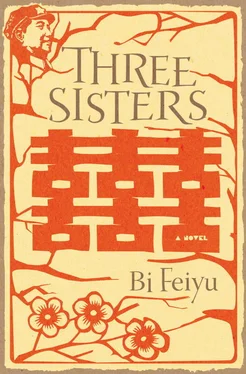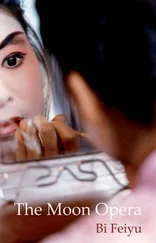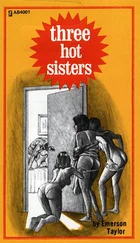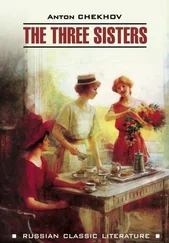Normally, in accordance with the principle of democratic centralism, Fenghua should not have been counted as being elected to the security team, but after centralizing, the homeroom teacher allowed her to join, saying that the student who’d received the most votes, a member of the athletic committee, was needed to work elsewhere. So Fenghua was on the team. She put on the army overcoat and leather belt, cutting a striking figure—brave and imposing—like a soldier or a policewoman.
Now that Fenghua was involved in school security, the homeroom teacher summoned her to his dorm room for a talk. He said that he expected her to be more active in all aspects of school functions, to become a true activist, and thereby to serve as a role model. He invited her to sit down, but she declined; instead, she stood by his desk, her finger rubbing the glass top under which the ten-yuan bill remained next to the teacher’s class schedule. It hadn’t been touched.
Her finger flitted back and forth, and she couldn’t stop smiling. Every sweep of that finger rubbed against the glass covering the ten-yuan bill. The teacher got up, paced the room, and shut the door. When he sat down again, Fenghua was overcome by a sudden unreasonable anxiety, and the smile disappeared from her face. Her fingers now moved mechanically over the desk as she cast her eyes upward, an absent-minded look on her face. The silence dragged on for a long time, since the teacher said nothing. Then, without warning, Fenghua blurted out, “You must have fallen in love in college, didn’t you?”
What she was asking—not to mention the fact that she’d addressed him as “you” and not “teacher”—echoed like a thunderclap.
“What kind of question is that?” he said sternly. The silence returned briefly until he spoke up again. “Who’d have fallen for someone like me?”
“That’s silly, teacher,” she said. “Teacher, you’re talking nonsense,” she added even more strongly. At this point she dared not look at him. Fenghua’s gaze returned to the money under the glass. “Why don’t you put that away? Are you that rich?”
He laughed. “One of my students ran into some hard times, but she wouldn’t accept my help.”
She smiled. “Who was the ungrateful wretch?”
She lifted the glass, fished the money out, turned, and walked out the door. Caught off guard by her actions, he sat frozen in his chair and stared at the door, which seemed to sway before his eyes. He was lost in thought, caught in flights of fancy.
The following morning, the homeroom teacher strode up to the podium only to find Fenghua’s seat unoccupied. A few minutes later she walked in—or, more accurately, sauntered in. She wore her army coat, and around her neck was a bright red, eye-catching scarf, obviously brand new.
“Sorry I’m late,” she said.
“Please, come in,” the teacher said. All quite proper and expected, as was the way she went over and took her seat—nothing out of the ordinary. But the teacher appeared inspired by the bright red scarf, having seen a connection between it and the ten yuan. His eyes lit up, and he was energized. “Why do we say ‘capital came into this world dripping in blood and filth’?” he asked in a booming voice. “Please open your books to page seventy-three.” His voice bounced off the walls. Only he was conscious of this—he and also Pang Fenghua—for it touched on no one else in the room but them. Even among all those prying eyes, it was their secret. And it was wondrous, exquisite.
Wei Xiangdong, in charge of daily concerns for the school union, was the head of the new security team. He stood out as a unique case at the school. A former student who was kept on as a teacher, he could boast no special quality except for a willingness to work hard. Mild-tempered and rather timid, he shocked everyone, himself included, at the onset of the Cultural Revolution, for no one ever expected that he had—and was willing to use—hard fists and that he was capable of decisive action; but he did and that quickly moved him up the ladder. Due to his actions, the school entered a new stage in the Revolution—as they say, “A single spark can turn into a prairie fire.” [13] A common phrase often used by Chairman Mao.
However, this new stage did not last long because history quickly exposed his true nature. Not a good person, he was someone actively engaged in beating, smashing, and looting during the Revolution.
When the old Party secretary was released from prison after the Cultural Revolution and resumed his position, the teachers thought that Wei would be in for a bad time. This did not happen.
“Let us not engage in class retaliation,” the Party secretary said. “Instead, let us unite in favor of stability. Class retaliation is not the correct attitude for historical materialists.” That public statement altered Wei’s fate.
After seventeen self-examinations, twenty-six tearful demonstrations, and nine solemn vows, he was returned to the school and assigned to the security section. Being the sole person in that section, he was also appointed as a member of the school union committee, which was responsible for duties related to daily life. The union was an interesting place because the position of chairman was traditionally assumed by the vice principal.
In practice, however, Wei was in charge, although the vice principal’s name was on the door of the chairman’s office. As a result, the school union stopped being a true union [14] This is not a union in the style of a workers’ organization; the responsibilities at a school are to furnish daily necessities.
and became the security section, an organ of the dictatorship. The daily duties conducted by the union all related to women: distributing birth control pills, condoms, sanitary napkins, and shampoo to the female faculty. Wei worked hard, and that, of course, was good. But most important was how he adjusted his attitude to fit each situation, whether the position was high or low. A true man knows when to be humble and when to be assertive.
Once, at a section meeting, he announced to the female faculty, “From now on, don’t think of me as a man, no, don’t even treat me as human. I am a feminine product you can use whenever you want.” With words like these coming from a big, husky man like Wei, the teachers laughed so hard they nearly doubled over. If it had been any other man, they’d have called him a scoundrel, but coming from him, the words sounded different. It was no easy matter for a rugged man like Wei to bounce back after taking such a fall, but he developed a cordial relationship with the female faculty. When the teachers came for their items, for instance, he’d say, “Here you are, Teacher Zhang, 3.3 centimeters long for your husband. Teacher Wang, this one is yours, 3.5 centimeters.”
Talk about shameless! How could he be so coarse? I’m coarse, I admit it, but what’s wrong with that? I am coarse. Back and forth they bantered and flirted. Instead of detesting him, the women actually welcomed someone who had a sense of humor and was eager to help. Who doesn’t like to joke and laugh? Who doesn’t want to be happy and cheerful every day? Who wants to constantly frown and live a life centered on class differences?
It was only logical for Wei to be in charge of the school security team, but the leadership followed strict organizational procedures in appointing him. Director Qian recommended Wei, but that required the personal consent of the Party secretary before it was approved. As someone who was capable of getting the job done, he was the ideal man. One semester he caught a pair of thieves on campus. Rather than beat or berate them, he tied their hands behind their backs before pasting medicinal plasters from the school infirmary over their eyes and letting them loose on the sports field, where they could walk, jump, or run, but not get away.
Читать дальше











